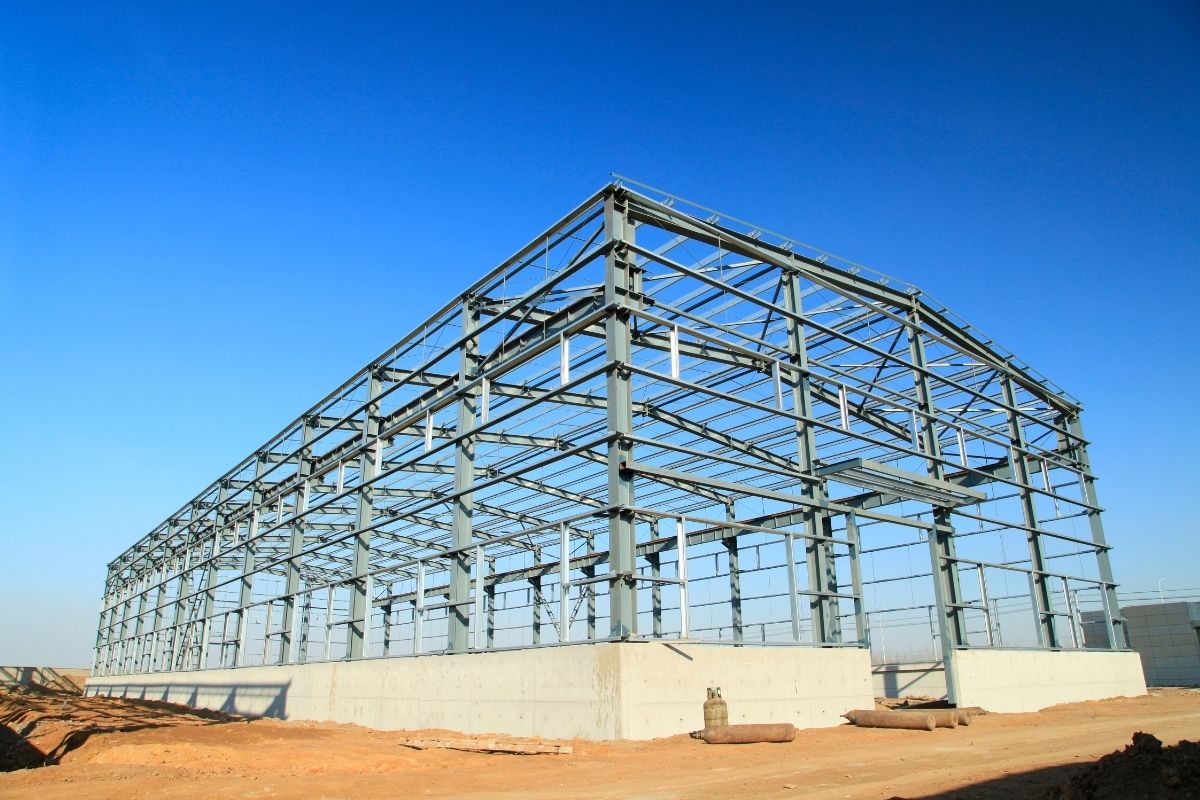Business
Steel Frame Buildings for Different Business Sectors: Versatile, Durable & Customisable Solutions

When it comes to constructing robust and versatile buildings, steel frame structures have become the go-to choice for various business sectors. From warehouses to retail spaces, the strength and flexibility of steel frames offer unparalleled advantages. I’ve seen firsthand how businesses benefit from these structures, whether they need quick assembly or long-term durability.
The adaptability of steel frame buildings makes them ideal for a range of industries. Manufacturing plants, educational institutions, and even healthcare facilities are increasingly opting for steel due to its cost-efficiency and sustainability. It’s clear that steel frame buildings are not just a trend but a smart investment for any forward-thinking business.
Overview of Steel Frame Buildings
Steel frame buildings have become a cornerstone in modern construction due to their durability and versatility. These structures are constructed using a steel skeleton instead of traditional materials such as wood or concrete. The framework consists of vertical columns and horizontal beams, creating a robust structure.
Durability and Strength
Steel stands out for its strength-to-weight ratio, making it an ideal material for large and high-rise buildings. The flexibility of steel allows it to withstand harsh weather conditions and seismic activities better than other materials. For instance, steel frames can endure strong winds and earthquakes, ensuring the safety and longevity of buildings.
Cost-Efficiency
Cost-efficiency is a critical factor for businesses considering construction projects. Steel frame buildings reduce the need for extensive site work and use prefabricated components, which lowers labour costs and shortens construction times. Additionally, steel is recyclable, providing a sustainable option that aligns with corporate responsibility goals. By choosing steel, businesses can save money in the long term due to lower maintenance and repair costs.
Design Flexibility
The adaptability of steel allows for innovative design solutions. Architects can create complex structures that would be difficult or impossible with other materials. Customisation options in steel frame buildings are vast, from creating open-plan spaces to integrating modern technologies. This flexibility is particularly beneficial in sectors like retail and hospitality, where space utilisation and aesthetic appeal are crucial.
Sustainable Choice
Sustainability is increasingly important for businesses. Steel is 100% recyclable, reducing environmental impact and conserving natural resources. Using steel frame buildings contributes to achieving green certifications like LEED. For example, recycling steel reduces the need for new raw materials and minimises carbon emissions during production.
Safety and Compliance
Steel frame buildings meet rigorous safety standards and comply with building regulations. Steel is non-combustible, reducing fire risks and enhancing building safety. Compliance with health and safety regulations is more straightforward with steel structures, ensuring businesses avoid legal issues and safeguard occupants.
Commercial Steel Buildings
Commercial steel buildings offer adaptable solutions for various industries. They provide strength, sustainability, and cost-efficiency.
Retail Stores
Steel frame buildings excel in creating retail spaces. They allow for customisable floor plans, enabling tailored layouts for specific retail needs. Large open spaces enhance customer experiences, accommodating both small boutiques and expansive department stores. Moreover, steel structures sustain heavy foot traffic and display equipment, ensuring durability. The use of prefabricated components speeds up construction, reducing downtime and operational delays. Steel’s design flexibility supports aesthetic features that attract customers and brand them distinctively. For example, curved facades and skylights can be seamlessly integrated.
Office Buildings
Steel frame buildings suit modern office environments efficiently. They offer flexible interior spaces, quickly adapting to changing organisational needs. Open-plan designs encouraged by steel structures create collaborative workspaces. Additionally, the superior strength-to-weight ratio allows adding more floors without compromising structural integrity, beneficial for expanding businesses. Prefabricated elements reduce construction times, minimising disruptions. These buildings also support sustainable practices, aligning with businesses seeking green certifications. Enhanced safety features, like non-combustibility and seismic resistance, ensure a secure work environment. Steel’s recyclability makes it a responsible choice for eco-conscious enterprises.
Industrial Steel Buildings
Steel frame buildings meet the specific needs of various industrial sectors, offering robust and scalable solutions.
Warehouses
Steel frame warehouses provide vast, open spaces free from internal columns. This design maximises storage capacity and facilitates the movement of goods. Prefabricated steel components allow for quick assembly, reducing construction timelines. Due to steel’s durability, these warehouses withstand heavy loads and harsh environmental conditions, ensuring long-term structural integrity.
Manufacturing Plants
In manufacturing plants, steel frame structures offer the flexibility required for complex machinery and production lines. High ceilings and expansive floor areas accommodate large equipment and assembly lines. Steel’s strength supports overhead cranes and other heavy-duty applications necessary in industrial manufacturing. Additionally, steel buildings can be easily modified to adapt to changing manufacturing requirements.
Distribution Centres
For distribution centres, efficient logistics and handling of vast inventories are critical. Steel frame buildings can be constructed with wide, open interiors that accommodate large storage systems and equipment. They facilitate the integration of advanced material handling systems such as conveyors and automated picking solutions. The fire-resistance properties of steel add an extra layer of safety, protecting valuable inventory from potential fire hazards.
Steel frame buildings prove invaluable in the industrial sector due to their adaptability, strength, and efficiency. Whether for warehousing, manufacturing, or distribution, they offer tailored solutions that meet industry-specific needs.
Agricultural Steel Buildings
Steel frame buildings excel in agricultural settings due to their durability and adaptability. These structures meet the unique demands of farming and livestock management efficiently.
Barns and Sheds
Steel barns and sheds offer robust protection against weather and pests. With ample space, they facilitate easy storage of equipment like tractors and harvesters. The non-combustible nature of steel also enhances fire safety. Personalising interiors for livestock housing, feed storage, and other needs is straightforward due to the flexible design options.
Storage Facilities
Steel storage facilities ensure secure, weather-resistant spaces for crops, seeds, and fertilisers. Customisable layouts accommodate various storage needs, including temperature control systems. Steel’s strength supports large doors and openings for easy access and transport of agricultural products. In addition, its low maintenance requirements result in reduced operational costs over time.
Advantages of Steel Frame Buildings
Steel frame buildings offer numerous advantages, making them ideal for various business sectors. Let’s explore some key benefits.
Durability and Strength
Steel frame buildings excel in durability and strength. Steel’s inherent properties make it resistant to rust, corrosion, and pests, unlike traditional materials. Structures can withstand harsh weather conditions, including high winds and heavy snow. Fire resistance is also higher with steel, providing a safer environment for occupants. For instance, industrial warehouses benefit from steel’s robust nature, ensuring the protection of valuable machinery and goods.
Cost-Effectiveness
Steel frame buildings are cost-effective for many businesses. Initial construction costs may be higher, but long-term savings outweigh these expenses. Steel structures minimise maintenance needs and decrease repair costs over time. Prefabricated components reduce labour expenses and speed up construction times. In retail applications, quicker build times mean faster operational starts, leading to a quicker return on investment.
Sustainability
Sustainability is a significant advantage of steel frame buildings. Steel is 100% recyclable, reducing environmental impact. The energy efficiency of steel structures is high, with opportunities for integrating renewable energy sources easily. For example, solar panels can be mounted on steel frames without significant adjustments. Sustainable construction practices in the hospitality sector adhere to green building standards, attracting eco-conscious customers and reducing operational costs.
Custom Design and Flexibility
Custom design and flexibility make steel frame buildings an optimal choice across various business sectors. Tailoring structures to meet specific needs, businesses benefit from adaptable layouts and scalable options. Steel frames offer open floor plans, accommodating diverse activities, whether in retail, hospitality, or office settings.
In retail environments, customisable spaces enhance product displays and customer flow. Hospitality venues like hotels and restaurants use flexible designs to create unique ambiances and accommodate different capacities. Offices benefit from open-plan designs, fostering collaboration and easy reconfiguration for growing teams.
Industrial sectors such as warehouses and manufacturing plants leverage flexible designs for efficient machinery layout and logistical operations. Open, unobstructed spaces optimise workflow and storage capacity. Distribution centres gain from adaptable designs that allow seamless integration of automated systems and conveyor belts.
Agricultural applications utilise steel frames for customisable barns and sheds, providing tailored solutions for livestock and storage. Flexible designs ensure proper ventilation, lighting, and access, essential for farming operations. Storage facilities benefit from layouts that can be adjusted based on crop cycles and storage needs.
Incorporating custom design and flexibility, steel frame buildings cater to the dynamic requirements of various business sectors succinctly. This ensures businesses can modify and expand their premises as needed, without compromising structural integrity or functionality.
To Conclude
Steel frame buildings truly stand out across diverse business sectors. Their durability and adaptability make them an excellent choice for retail, hospitality, and office environments. They also excel in industrial and agricultural settings, offering robust solutions that meet specific operational needs. With customisable layouts and scalable options, steel frames provide the flexibility required for dynamic business demands. Whether it’s fostering collaboration in offices or ensuring efficient operations in industrial plants, steel frame buildings prove to be a versatile and reliable solution for any business sector.
Business
The Unexpected Advantages of Hiring a Female Lawyer Near Me for Your Case

Searching for the right female lawyer near me after a personal injury can be a turning point in your recovery journey. Whether you’re coping with physical injuries from a car accident or facing emotional distress due to another person’s negligence, the legal representation you choose plays a critical role in your ability to move forward. Many people today seek a legal ally who not only understands the law but also brings compassion, strength, and a personal touch to the case—that’s where a skilled female attorney truly shines.
In the legal world, the number of women leading successful personal injury practices is growing, and for good reason. Clients often feel a deeper level of understanding and trust with a woman lawyer, especially when discussing sensitive matters related to injuries, pain, trauma, and financial stress. This makes searching for a female lawyer near me not just a preference—but a wise, strategic decision.
The Unique Perspective of Female Attorneys
There’s something distinct about the way many female attorneys approach personal injury cases. With a strong sense of empathy, communication, and attention to detail, women lawyers often bring a unique balance of professionalism and genuine care to the legal process. They listen deeply, advocate fiercely, and work hard to ensure their clients feel heard, supported, and empowered.
It’s not unusual for a client to walk into a law office feeling overwhelmed, unsure of where to begin. A female attorney is often skilled at helping individuals feel at ease, breaking down complex legal procedures into simple, actionable steps, and guiding them with patience every step of the way.
Why So Many Are Seeking Attorney Women Pasadena Professionals
In communities like Pasadena, the demand for attorney women Pasadena locals can count on is rising. Clients want legal guidance that is not only skilled but also approachable and relatable. When someone experiences an accident—whether it’s a vehicle collision, pedestrian injury, or fall—they often feel vulnerable. Knowing that your legal advocate understands and respects your perspective can make a significant difference.
Attorney women Pasadena professionals are standing out for their ability to deliver high-quality legal results while maintaining strong personal connections with their clients. They fight vigorously for justice, whether negotiating a settlement or representing you in court, all while maintaining an atmosphere of trust and transparency.
What to Expect When Working With a Woman Lawyer
When you work with a woman lawyer, the first thing you’ll likely notice is the emphasis on communication. She’ll want to understand your story—not just the legal facts, but how your life has been affected by your injury. This holistic approach helps build a stronger case and ensures that no detail goes unnoticed.
She will also provide clarity on key aspects such as:
- Medical bills and future care costs
- Missed wages or job impact
- Pain and suffering damages
- Dealing with insurance adjusters
- Filing paperwork and meeting legal deadlines
In addition to technical expertise, you can expect compassion, availability, and a sincere investment in your recovery.
The Personal Touch in Legal Representation
Clients often express that working with a female attorney feels more personal. It’s not just about legal outcomes—it’s about feeling safe, respected, and supported during a very challenging time. Whether you’re meeting in an office or speaking over the phone, having someone who understands your emotional and physical hurdles makes all the difference.
Personal injury cases can involve sensitive issues, from mobility challenges to emotional trauma. Many people feel more at ease sharing those details with a woman, which in turn helps their attorney build a stronger, more accurate legal claim.
Choosing the Right Female Attorney Near You
So how do you find the right woman lawyer for your case? Begin with research. Look for attorneys who specialize in personal injury and have a proven track record in car accident, slip-and-fall, or workplace injury cases. Client testimonials, case results, and online reviews can provide valuable insights into a lawyer’s style and success.
Don’t hesitate to schedule a free consultation—this gives you the chance to ask questions, assess communication style, and determine if the attorney is a good fit for your needs.
During the consultation, consider asking:
- How long have you practiced personal injury law?
- What is your experience with cases similar to mine?
- How do you handle negotiations with insurance companies?
- Will I be working directly with you or your team?
These questions help you evaluate not just expertise, but how involved the attorney will be throughout your case.
Empowering Clients With Strong Legal Advocacy
The right female attorney won’t just manage your case—she’ll empower you along the way. From filing a claim to negotiating fair compensation, she’ll be there to ensure your voice is heard and your interests are protected.
Representation from attorney women Pasadena professionals often leads to outcomes that reflect the true impact of an injury—because they understand the nuances of how injuries affect lives. It’s not just about legal jargon or courtroom arguments; it’s about real people, real pain, and real recovery.
Personal injury can change your life in an instant, but the support of the right lawyer can help you regain your footing. If you’re looking for someone who offers a blend of legal strength and personal understanding, finding a female lawyer near me might be your best first step.
By choosing an attorney who listens, leads with empathy, and fights relentlessly for justice, you position yourself for a better outcome—both legally and emotionally. And when that lawyer is one of the experienced attorney women Pasadena is proud to call its own, you can feel confident knowing your case is in excellent hands.
Blog
What’s Involved in Professional Relocation Services?

Whether you’re relocating your home or business, professional movers can assist you throughout the entire process. A trucking company can assess the type of load you have, whether it’s fragile or more durable, to determine the appropriate vehicle and packing style to use. Here are some things involved in professional relocation services:
Planning the Move
Before your move, a relocation consultant meets with you to discuss different aspects to customize their services. This specialist may ask you about your destination, family size, and relocation date to guide you on what to expect. For a smooth relocation process, a trucking company can help you identify delicate, high-value, or specialty items that require careful transportation. During your meeting, a professional informs you about the full or partial services they offer, allowing you to choose the services that best suit your needs. These may include tasks such as packing or moving items from your home into the truck. If you need packing supplies, such as boxes, tape, and tie rope, you can request them during your consultation.
Packing and Unpacking
Reputable moving companies can help you pack your items in different rooms, labeling them to avoid confusion. To prevent damage, these movers use sturdy boxes, bubble wrap, and packing paper to organize your delicate and common belongings. If you would like to pack some items and leave others for the crew, you can request partial packing services. When you arrive at the location, the crew removes everything from the boxes and arranges it in the designated rooms. These professionals may also assemble large items, such as beds, tables, or bookshelves, to simplify your work and help you settle in more quickly.
Loading and Transporting Goods
Once moving experts have packed all your belongings, they load them onto a truck carefully so they are organized and safe. The team places heavy items first to create a stable base and maintain the truck’s balance during transport. Many professional relocation services offer tracking options, allowing you to monitor any potential delays and track the location of your items. When transporting your possessions, a qualified company gives you updates through phone calls, text messages, or email on an approximate delivery time.
Offering Storage
If your new home isn’t ready or you need a temporary place to keep your belongings, many relocation companies offer storage solutions. Whether you need to store your items for a short or long period, you can discuss your needs with these specialists. For sensitive items like electronics, antiques, or artwork, climate-controlled units are a suitable option to protect them from weather changes. A team can also pack some items in sealed containers and place them in secure storage units. Once you are ready, you can move your belongings in phases until you empty the self-storage unit.
Work With Reliable Movers
Whether you’re moving to a short or long distance, hire a reliable trucking company to help you relocate without inconveniences. These professionals load vehicles within the recommended weight limits to be in compliance with regulations and minimize damage. To learn more about the relocation services we offer, call a qualified mover today.
Business
Why Onchain Wallets Matter More Than Ever in Web3

As cryptocurrency adoption expands and Web3 ecosystems become more dynamic, one question keeps surfacing among users: Where should I store my crypto? And more importantly, who really owns it once I do?
For many, the journey starts on a centralized exchange. But increasingly, users are shifting away from platforms that hold custody of their funds—and moving toward Onchain wallets, also known as self-custodial wallets.
This shift isn’t just a trend. It’s a deeper movement toward ownership, security, and independence in the decentralized world.
What Is an Onchain Wallet?
Onchain wallet is a digital application that enables people to manage, record, and interact with cryptocurrencies without using an intermediary. An Onchain wallet, unlike a centralised exchange wallet, places everything under the control of the user.
With an Onchain wallet, you own the keys; in other words, you remain in possession of your assets. Your wallet gets you specifically linked straight into the blockchain: rather than seeing your balance, your interaction with any decentralized applications (dApps) or staking tokens, or making an NFT, it is the wallet verification that concludes transactions.
Why users are embracing Onchain wallets:
- Complete asset ownership — no one can freeze or access your funds without your approval.
- Web3-ready — seamless access to DeFi, NFT platforms, DAOs, and more.
- Privacy by design — no identity verification or KYC required in most cases.
An Onchain wallet is more than a storage solution. It’s a gateway to everything Web3 offers.
Onchain Wallet vs Centralized Exchange: What’s the Real Difference?
Centralized exchanges play an important role in onboarding users. They offer a familiar experience, simplified fiat on-ramps, and fast transactions. But there’s one major caveat: you don’t control your crypto unless you move it to a wallet where you hold the keys.
In other words, the exchange holds your assets and can freeze, limit, or restrict access at any time.
By contrast, an Onchain wallet ensures self-custody. You sign every transaction, control all movements, and remain in full ownership of your funds. Here’s how the two compare:
| Feature | Onchain Wallet | Centralized Exchange |
| Ownership | You hold the private keys | The platform holds the funds |
| Security | User-controlled if keys are safe | Centralized and often targeted |
| Web3 Access | Full dApp, DeFi, NFT interaction | Limited to platform functions |
| Withdrawals | Instant and unrestricted | May involve delays or limits |
| KYC Requirements | Usually not required | Mandatory for most features |
If your goal is to trade quickly with fiat, exchanges are useful. But if you’re interested in long-term holding, security, or participating in Web3, an on-chain wallet is the right tool.
Why Self-Custody Is Becoming the Standard
The past few years have seen some of the largest centralized failures in crypto history—platform collapses, frozen withdrawals, and security breaches that left users locked out of their funds overnight.
Those events sent a clear message: trusting a platform isn’t the same as owning your crypto.
Onchain wallets give users back control. When you manage your keys, you’re no longer dependent on third parties. You can:
- Participate in governance, staking, and airdrops
- Explore DeFi protocols and NFT platforms freely
- Protect your assets from custodial failures or regulatory restrictions
And contrary to what many assume, using an Onchain wallet is not overly technical. Today’s leading wallets are designed for accessibility and ease of use—no blockchain expertise required.
Bitget Wallet: A Seamless Onchain Wallet Built for Everyone

Bitget Wallet is one of the latest wallet solutions that stand out today in many ways, especially as an on-chain, easy-to-use, secure, and Web3-ready wallet used by more than 80 million users globally.
You are minting NFTs, dealing with smart contracts, or just want a less risky place to keep your assets. Bitget Wallet has what you require, without compromising the user experience.
Key features of Bitget Wallet:
130+ supported blockchains
1 M+ tokens supported across networks
PayFi integration — spend crypto via Visa or Mastercard
Built-in dApp browser for easy access to DeFi platforms
Staking, cross-chain swaps, and real-time portfolio tracking
It’s everything an Onchain wallet should be—secure, versatile, and simple to use.
How to Decide if an Onchain Wallet Is Right for You
When it comes to your crypto objectives, the wallet setup selection is determined by your requirements. A centralized exchange can still be a factor in case you intend to execute a high number of fiat trades. However, in case you want to experiment with Web3 or store assets long-term, you can not do it without an Onchain wallet.
Consider the following:
- Do you want full control over your assets? → Use an Onchain wallet.
- Are you active in NFTs, DeFi, or DAOs? → Onchain access is non-negotiable.
- Need fiat onramps or offramps? → Use an exchange as needed, but keep assets in your wallet.
- Ready to manage a recovery phrase? → Bitget Wallet provides simple onboarding to help you start safely.
Many users adopt a hybrid strategy: holding most of their crypto in an Onchain wallet like Bitget wallet for security and flexibility, while using exchanges only for quick trades or fiat transactions.
Final Thought:
Owning crypto should mean owning the freedom that comes with it. That freedom is only real when your assets are in your hands, not held by a third party.
Onchain wallets like Bitget Wallet give users that control. Whether you’re just starting out or already deep into Web3, making the move to self-custody is a step toward true financial independence.
 Take Control of Your Crypto
Take Control of Your Crypto
Ready to explore the full potential of Web3?
Download Bitget Wallet and join millions of users managing their crypto securely across 130+ blockchains.
With Onchain access, full ownership, and powerful tools built into one smooth experience, Bitget Wallet helps you take charge on your terms.
-

 Travel3 years ago
Travel3 years agoNEW ZEALAND VISA FOR ISRAELI AND NORWEGIAN CITIZENS
-

 Technology3 years ago
Technology3 years agoIs Camegle Legit Or A Scam?
-

 Uncategorized3 years ago
Uncategorized3 years agoAMERICAN VISA FOR NORWEGIAN AND JAPANESE CITIZENS
-

 Health3 years ago
Health3 years agoHealth Benefits Of Watermelon
-

 Home Improvement5 months ago
Home Improvement5 months agoArtificial Grass Designs: Perfect Solutions for Urban Backyards
-

 Fashion2 years ago
Fashion2 years agoBest Essentials Hoodies For Cold Weather
-

 Uncategorized3 years ago
Uncategorized3 years agoHow can I write a well-structured blog post?
-

 Technology1 year ago
Technology1 year agoImagine a World Transformed by Technology and Innovation of 2023-1954













